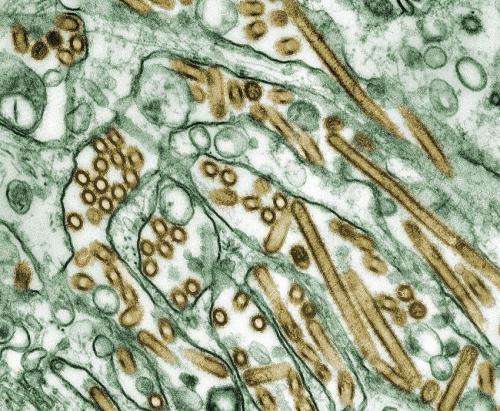This article has been reviewed according to Science X's editorial process and policies. Editors have highlighted the following attributes while ensuring the content's credibility:
fact-checked
reputable news agency
proofread
Human cases of bird flu 'an enormous concern': WHO

The World Health Organization voiced alarm Thursday at the growing spread of H5N1 bird flu to new species, including humans, who face an "extraordinarily high" mortality rate.
"This remains I think an enormous concern," the UN health agency's chief scientist Jeremy Farrar told reporters in Geneva.
The current bird flu outbreak began in 2020 and has led to the deaths of tens of millions of poultry, with wild birds also infected as well as land and marine mammals.
Cows and goats joined the list last month—a surprising development for experts because they were not thought susceptible to this type of influenza.
The A (H5N1) strain has become "a global zoonotic animal pandemic", Farrar said.
"The great concern of course is that in... infecting ducks and chickens and then increasingly mammals, that virus now evolves and develops the ability to infect humans and then critically the ability to go from human to human."
So far, there is no evidence that the influenza A(H5N1) virus is spreading between humans.
But in the hundreds of cases where humans have been infected through contact with animals, "the mortality rate is extraordinarily high", Farrar said.
From the start of 2023 to April 1 this year, the WHO said it had recorded 463 deaths from 889 human cases across 23 countries, putting the case fatality rate at 52 percent.
In a worrying development, US authorities earlier this month said a person in Texas was recovering from bird flu after being exposed to dairy cattle.
It was only the second case of a human testing positive for bird flu in the country, and came after the virus sickened herds that were apparently exposed to wild birds in Texas, Kansas and other states.
It also appears to have been the first human infection with the influenza A(H5N1) virus strain through contact with an infected mammal, WHO said.
When "you come into the mammalian population, then you're getting closer to humans," Farrar said, warning that "this virus is just looking for new, novel hosts".
"It's a real concern."
Farrar called for beefing up monitoring, insisting it was "very important understanding how many human infections are happening... because that's where adaptation (of the virus) will happen".
"It's a tragic thing to say, but if I get infected with H5N1 and I die, that's the end of it. If I go around the community and I spread it to somebody else then you start the cycle."
He said efforts were under way towards the development of vaccines and therapeutics for H5N1, and stressed the need to ensure that regional and national health authorities around the world have the capacity to diagnose the virus.
This was being done so that "if H5N1 did come across to humans, with human-to-human transmission", the world would be "in a position to immediately respond", Farrar said, urging equitable access to vaccines, therapeutics and diagnostics.
© 2024 AFP





















